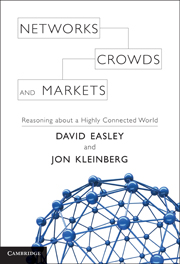Book contents
- Frontmatter
- Contents
- Preface
- 1 Overview
- Part I Graph Theory and Social Networks
- Part II Game Theory
- 6 Games
- 7 Evolutionary Game Theory
- 8 Modeling Network Traffic Using Game Theory
- 9 Auctions
- Part III Markets and Strategic Interaction in Networks
- Part IV Information Networks and the World Wide Web
- Part V Network Dynamics: Population Models
- Part VI Network Dynamics: Structural Models
- Part VII Institutions and Aggregate Behavior
- Bibliography
- Index
6 - Games
from Part II - Game Theory
Published online by Cambridge University Press: 05 June 2012
- Frontmatter
- Contents
- Preface
- 1 Overview
- Part I Graph Theory and Social Networks
- Part II Game Theory
- 6 Games
- 7 Evolutionary Game Theory
- 8 Modeling Network Traffic Using Game Theory
- 9 Auctions
- Part III Markets and Strategic Interaction in Networks
- Part IV Information Networks and the World Wide Web
- Part V Network Dynamics: Population Models
- Part VI Network Dynamics: Structural Models
- Part VII Institutions and Aggregate Behavior
- Bibliography
- Index
Summary
In the opening chapter of the book, we emphasized that the “connectedness” of a complex social, natural, or technological system really means two things: first, an underlying structure of interconnecting links, and second, an interdependence in the behaviors of the individuals who inhabit the system, so that the outcome for any one depends at least implicitly on the combined behaviors of all. The first issue – network structure – was addressed in the first part of the book using graph theory. In this second part of the book, we study interconnectedness at the level of behavior, developing basic models for this in the language of game theory.
Game theory is designed to address situations in which the outcomes of a person's decisions depend not just on how they choose among several options, but also on the choices made by the people with whom they interact. Game-theoretic ideas arise in many contexts. Some contexts are literally games; for example, choosing how to target a soccer penalty kick and choosing how to defend against it can be modeled using game theory. Other settings are not usually called games, but they can be analyzed with the same tools. Examples include the pricing of a new product when other firms have similar new products, deciding how to bid in an auction, choosing a route on the Internet or through a transportation network, deciding whether to adopt an aggressive or a passive stance in international relations, or choosing whether to use performance-enhancing drugs in a professional sport. In these examples, each decision-maker's outcome depends on the decisions made by others. This introduces a strategic element that game theory is designed to analyze.
- Type
- Chapter
- Information
- Networks, Crowds, and MarketsReasoning about a Highly Connected World, pp. 139 - 188Publisher: Cambridge University PressPrint publication year: 2010
- 2
- Cited by



